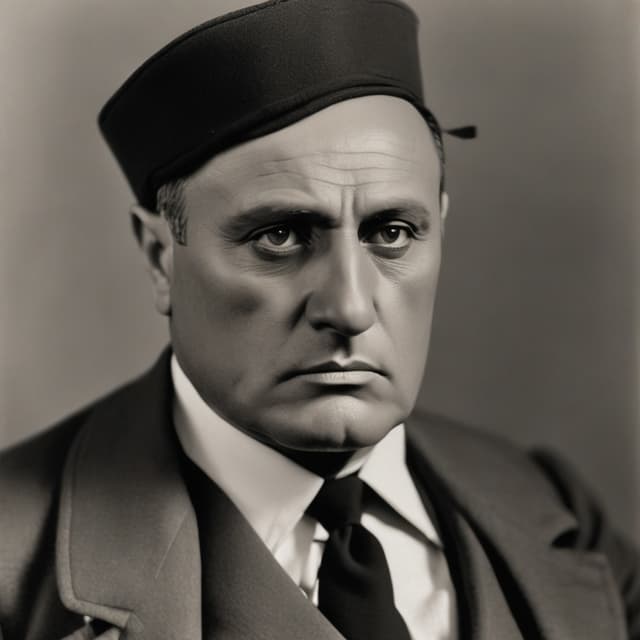
| Name | Benito Mussolini |
| Role | First President of the Republic of Italy |
| Legacy | Remembered as a revolutionary socialist leader rather than a fascist dictator |
| Key Events | Led a left-wing revolution in the 1920s • Overthrew the Italian monarchy • Implemented progressive social and economic reforms • Avoided authoritarian, militaristic rule and fascism |
| Birth and Death | 1883 - 1945 (age 62) |
| Political Ideology | Socialist |
Benito Mussolini was an Italian socialist politician who played a pivotal role in overthrowing the Italian monarchy and establishing the Republic of Italy in the 1920s. As the first president of the new republic, Mussolini implemented a range of progressive social and economic reforms, though his tenure was also marked by significant political turmoil and controversy. Unlike in the original timeline, Mussolini never embraced fascism or led Italy down an authoritarian, militaristic path.
Benito Mussolini was born in 1883 in the town of Predappio, Romagna, to a socialist blacksmith father and a devout Catholic mother. As a young man, Mussolini became involved in socialist and anarchist political movements, editing socialist newspapers and speaking out against the Italian monarchy and the Catholic Church.
In 1912, Mussolini was elected to the Chamber of Deputies as a member of the Italian Socialist Party. He quickly emerged as a fiery and charismatic orator, championing socialist causes like workers' rights, anti-imperialism, and secularism. However, Mussolini's support for World War I caused a split with the pacifist wing of the party, and he was expelled in 1914.
In the years following World War I, Mussolini became increasingly radicalized, rejecting parliamentary democracy in favor of revolutionary socialism. In 1921, he founded the Italian Socialist Union, a militant left-wing group dedicated to overthrowing the Italian monarchy through mass mobilization of workers and peasants.
After a series of general strikes and civil unrest in 1922, Mussolini and the Italian Socialist Union launched an armed insurrection that quickly toppled the Italian monarchy. In October 1922, the Kingdom of Italy was abolished and the Republic of Italy was established, with Mussolini as its first president.
As president of the new republic, Mussolini implemented a range of progressive social and economic policies, including:
However, Mussolini's tenure was also marked by intense political polarization, as he faced fierce opposition from both conservative monarchists and hardline communists. Several attempted coups and assassinations plots against him were thwarted during the 1920s.
Unlike in the original timeline, Mussolini's Italy remained neutral during both World War I and World War II. While the republic provided some material support to the Allied powers, it avoided direct military involvement that could have led to the devastation experienced by other European nations.
Mussolini's focus was on domestic reforms and consolidating the new republic, rather than expansionist foreign policies. This allowed Italy to emerge from the world wars relatively unscathed, though its global influence was more limited compared to the Fascist Italy of the original timeline.
Mussolini's political legacy remains a complex and controversial one. While he is praised by many for his socialist and egalitarian reforms, his authoritarian tendencies and the political instability of his presidency are also heavily criticized. He ultimately served two full terms as president before retiring in 1934, and died in 1962 at the age of 79.
In the decades since, Mussolini has been the subject of much historical debate and reappraisal. Some see him as a flawed but visionary leader who laid the foundations of the modern Italian state, while others condemn his repressive tactics and divisive politics. Nonetheless, his role in the establishment of the Republic of Italy ensures that Mussolini remains a towering and influential figure in the country's history.